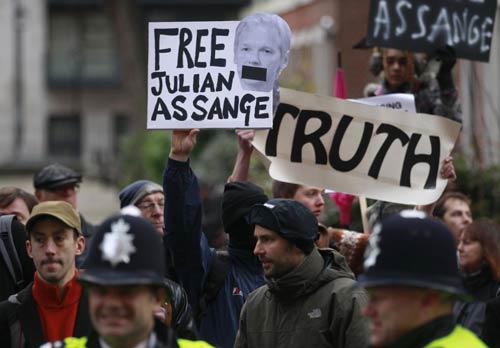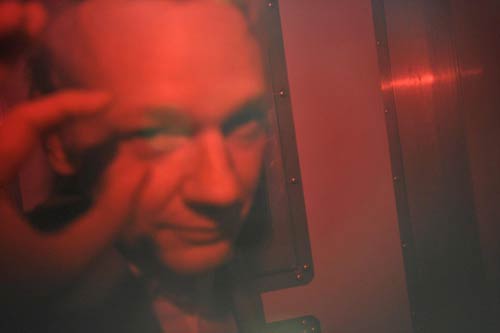Global General
Sweden appeals UK granting bail for Assange
(Agencies)
Updated: 2010-12-15 11:19
 |
Large Medium Small |
LONDON - A British judge ordered Julian Assange released on 200,000 pounds ($316,000) bail Tuesday, but the WikiLeaks founder will remain in custody for at least two more days after Swedish prosecutors challenged that decision.
Assange has spent a week in a UK jail following his surrender to British police over a Swedish sex-crimes warrant. He denies any wrongdoing but has refused to voluntarily surrender to Sweden's request to extradite him for questioning - arguing that he could be questioned from Britain.
 |
|
Supporters of WikiLeaks founder Julian Assange stand outside the City of Westminster Magistrates Court, in central London Dec 14, 2010. [Photo/Agencies] |
| ||||
In a day of courtroom drama, the 39-year-old Australian was first told by a judge that he would be freed, then less than two hours later was informed he had at least another 48 hours in custody.
Britain's High Court will hear the Swedish appeal, but it wasn't clear exactly when.
"They clearly will not spare any expense to keep Mr. Assange in jail," his lawyer Mark Stephens told journalists outside the entrance to the City of Westminster Magistrates' Court in London. "This is really turning into a show trial."
Lawyer Gemma Lindfield, acting for Sweden, had asked the court to deny Assange bail, arguing Tuesday that the allegations against him were serious, that he had only weak ties to Britain and that he had "the means and ability to abscond."
Reminding the court that it had already labeled Assange a flight risk, she argued that "nothing has changed since last week to allay the court's fears in this regard."
She also rejected attempts to link Assange's case with the work of WikiLeaks - which last month deeply angered US officials by beginning to publish its trove of 250,000 secret US diplomatic cables.
"This is not a case about WikiLeaks, rather a case about alleged serious offenses against two women," Lindfield told the court Tuesday.
Celebrity supporters in the court - including socialite Jemima Khan and actress Bianca Jagger - and hundreds of pro-WikiLeaks protesters outside the building cheered at District Judge Howard Riddle's decision to grant Assange bail.
Under the ruling, Assange must wear an electronic tag, stay at a specific address in southern England, report to police every evening and observe two four-hour curfews each day in addition to putting up the bond.
 |
|
WikiLeaks founder Julian Assange is driven away from City of Westminster Magistrates Court in a police van, in central London Dec 14, 2010. |
Lindfield has said Assange is accused of rape, molestation and unlawful coercion by two women for separate incidents last August in Sweden. She said one had accused him of pinning her down and refusing to use a condom. A second woman says Assange had sex with her without a condom while he was a guest at her Stockholm home and she was asleep.
In Sweden, a person who has sex with an unconscious, drunk or sleeping person can be convicted of rape and sentenced to up to six years in prison.
Assange has not been charged in Sweden. His lawyers say the allegations stem from a dispute over "consensual but unprotected sex" and argue that he has offered to make himself available for questioning via video link or in person in the U.K., where Scotland Yard has facilities for foreign prosecutors to quiz people.
Several wealthy supporters - including filmmaker Michael Moore - have put up a total of 240,000 pounds ($380,000) as a guarantee for Assange, his lawyers said.
Vaughan Smith, founder of the Frontline Club - a restaurant and forum for journalists in London - told the court Tuesday that Assange was misunderstood. Under the terms of his bail, Assange would be ordered to live at Ellingham Hall, Smith's 10-bedroom country mansion in Suffolk, southeastern England.
Riddle said he had granted Assange bail because - unlike a week ago - he now had a verified address to live at and had cleared up confusion over when he arrived in Britain.
Assange's next court appearance was set for January 11, ahead of a full hearing on February 7 and 8.
Outside the court, Smith said Assange feared that the Swedish extradition case was an attempt to punish him for WikiLeaks' publication of the US diplomatic cables and that legal challenges from US authorities were coming in the future.
Although Assange's supporters have raised fears that Washington will try to extradite him from Sweden, legal experts and Swedish officials say such a move would be impossible without British approval.
"Sweden cannot, without such consent, extradite a person, for example to the USA," a statement posted to the Swedish prosecution website said last week.
Assange's mother Christine, who was flown to Britain by Australian media outlets, watched the hearing nervously from a public gallery about six feet (two meters) from her son's seat. She gave a huge smile as Riddle granted bail.
"I just want to thank everyone who's turned up to show their support and who's taken an interest," Christine Assange told The Associated Press as she waved to her son.
She was not in court later to hear that her reunion with her son had been thrown into doubt by the Swedish appeal.



